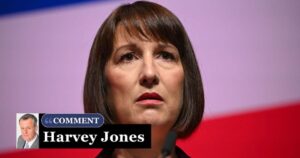
UK inflation marginally fell in the year to December but remained stubbornly above the Bank of England’s 2% target.
Consumer Prices Index (CPI) inflation rose to 2.5% in the 12 months to December, down from 2.6% the previous month, the Office for National Statistics (ONS) has said.
The ONS attributed December’s slight drop to lower hotel prices and a smaller increase in tobacco costs compared to the previous year, though higher fuel and second-hand car prices provided some upward pressure.
Grant Fitzner, chief economist at ONS, said: “Inflation eased very slightly as hotel prices dipped this month but rose a year ago. The cost of tobacco was another downward driver, as prices increased by less than this time last year.”
He added: “This was partly offset by the cost of fuel and also second-hand cars, which saw their first annual growth since July 2023.”
Economists anticipate a “temporary reprieve” before price rises pick up pace this year due to the Chancellor’s Budget measures. They expect price pressures to build from 2025, with inflation forecast to reach 3.2% in April.
Sanjay Raja, a senior economist for Deutsche Bank, said: “Looking ahead, price momentum will only pick up from here.
“Increases to the National Living Wage and Employer National Insurance Contributions will, we expect, push inflation higher over 2025. Higher energy prices won’t help either, nor will higher food prices, which are starting to emerge.”
Martin Sartorius, principal economist at the Confederation of British Industry, agreed that the Chancellor’s hike in employers’ national insurance would contribute to inflation remaining “elevated” this year despite December’s slight fall.
He said: “We expect inflation will stay elevated this year, partly due to autumn budget measures contributing to higher prices.”
Responding to the surprise drop, Chancellor of the Exchequer Rachel Reeves said she would “fight every day” to improve people’s living standards.
She said: “There is still work to be done to help families across the country with the cost of living. That’s why the Government has taken action to protect working people’s payslips from higher taxes, frozen fuel duty and boosted the national minimum wage.
“In our plan for change, we were clear that growth is our number one priority to put more money in the pockets of working people. I will fight every day to deliver that growth and improve living standards in every part of the UK.”
While inflation remains higher than the target of 2%, markets still anticipate the Bank of England reducing interest rates in February. However, the prospect of rising inflation means the “path remains murky” for many more.
Scott Gardner, investment strategist at digital wealth manager Nutmeg, said: “Policymakers and treasury officials will be breathing a small sigh of relief as new data shows that inflation fell during the final month of 2024, beating market expectations.
“This data will increase the chances that the Bank of England cuts interest rates in February, though the path remains murky for multiple interest rate cuts this year.”
Ed Monk, associate director at Fidelity International, said: “Inflation is stubbornly above target while growth has begun to slowdown – that’s the path to ‘stagflation’.”
He added: “The market view of where rates will land has been shifting, with one fewer rate cut now expected in 2025 than was the case a month ago. Markets ahead of the inflation print were suggesting another two cuts this year. Today’s reading keeps that on track for now.”
The latest figures come amid a period of turbulence in the UK financial markets, with the pound’s value dropping sharply and the cost of borrowing rising to decades-high levels over the past week.
Amid the market turmoil – which puts the Government’s plans for the nation’s finances at risk – Ms Reeves was adamant about the need to search for economic growth swiftly.
She told the House of Commons: “We have seen global economic uncertainty play out in the last week. But leadership is not about ducking these challenges. It is about rising to them.”
Darren Jones, the Chief Secretary to the Treasury, has since confirmed there won’t be a “mini-budget” held in March.
He told Times Radio: “We’ve been very clear there’s only going to be one major fiscal event, Treasury language for a budget, a year. We did that in the autumn last year.”
Pressed on whether he was ruling out a mini-budget, he said there would be a spring statement on March 26. He said: “We will only be having one major fiscal event a year, budget, and that will be in the autumn.”

















